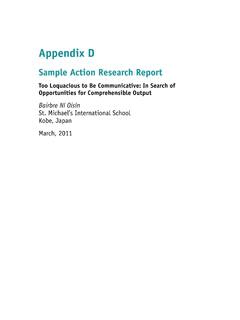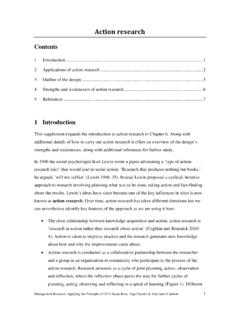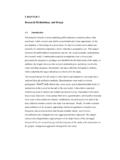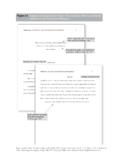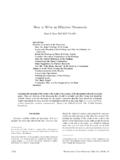Transcription of references - Audience Dialogue
1 references Abbott, Andrew. 2001. Time Matters. Chicago: University of Chicago Press. Abell, Peter. 1987. The Syntax of Social Life: the Theory and Method of Comparative Narratives. Oxford: Clarendon Press. Abraham, Selva. 1994. Exploratory action research for Manager Development. Brisbane: action Learning, action research and Process Management Association. Ackoff, Russell. 1974. Redesigning the Future. New York: John Wiley. Ackoff, Russell. 1978. The Art of Problem Solving. New York: John Wiley. Ackoff, Russell. 1981. Creating the Corporate Future. New York: John Wiley. Adelson, Marvin. 1989. Reflections on the past and future of the future. Technological Forecasting and Social Change 36 (1-2) 27-37.
2 Adyaa, Monica, et al. 2000. An application of rule-based forecasting to a situation lacking domain knowledge. International Journal of Forecasting 16: 471-484. Ajzen, Icek. 2001. Nature and operation of attitudes. Annual Review of Psychology 52:27-58. Alderfer, Clayton P. 1969. An empirical test of a new theory of human needs. Organizational Behavior and Human Decision Processes 4 (2) 142-175. Alexander, Christopher, et al. 1977. A Pattern Language. New York: Oxford University Press. Alexander, William F, and Richard W Serfass. 1999. Futuring Tools for Strategic Quality Planning in Education. Milwaukee: American Society for Quality Press. Almond, Russell G. 1995. Graphical Belief Modeling. London: Chapman and Hall.
3 Alvesson, Mats, and Kaj Sk ldberg. 2000. Reflexive Methodology: New Vistas for Qualitative research . London: Sage. Amara, Roy. 1981. The futures field: how to tell good work from bad. The Futurist 15 (2) 63- 71. Amara, Roy. 1991. Views on futures research methodology. Futures 23 (6) 645-649. Ambrosini, V ronique, and Cliff Bowman. 2002. Mapping successful organizational routines. Pp 19-45 in Mapping Strategic Knowledge, edited by Anne S Huff and Mark Jenkins. London: Sage. Ames, Stephen C. 1997. Community visioning: planning for the future in Oregon's local communities. San Diego: American Planning Association conference, June 1997. Anastasi, Chris. 2003. Participative scenario development: some observations from practical experience.
4 Maastricht, Netherlands: ICIS: EU Advanced Summer Course in Integrated Assessment Methodology, September 2003. Andersen, David F, George P Richardson, and Jac M Vennix. 1997. Group model building: adding more science to the craft. System Dynamics Review 13 (2) 187-201. Dennis List: PhD thesis 332 references Andersen, Ida-Elisabeth, and Birgit Jaeger. 1999. Danish participatory models: scenario workshops and consensus conferences: towards more democratic decision-making. Science and Public Policy 26 (5) 331-340. Anderson, Eugene W, and Claes Fornell. 2000. Foundations of the American Customer Satisfaction Index. Total Quality Management 11 (7) S869-S882. Andrews, K R. 1980. The Concept of Corporate Strategy (2nd edition).
5 Homewood, USA: Irwin. Argyris, Chris. 2000. Flawed Advice: How can Managers Know When They're Getting Good Advice and When They're Not. New York: Oxford University Press. Argyris, Chris, and Donald Sch n. 1978. Organizational Learning: a Theory of action Perspective. Reading, USA: Addison-Wesley. Argyris, Chris, Robert Putnam, and Diana Maclain Smith. 1985. action Science. San Francisco: Jossey-Bass. Aristotle. 350 BC. Physics : The Four Causes, translated by R P Hardie and R K Gaye. Cambridge, USA: Internet Classics Archive. Online at , accessed 30 March 2005. Armstrong, J Scott. 1978. Long-Range Forecasting: From Crystal Ball to Computer. New York: John Wiley. Armstrong, J Scott. 1986. research on forecasting: a quarter-century review, 1960-1984.
6 Interfaces 16 (1) 89-103. Armstrong, J Scott (ed). 2001. Principles of Forecasting. Boston: Kluwer. Armytage, W H G. 1968. Yesterday's Tomorrows: a Historical Survey of Future Societies. London: Routledge and Kegan Paul. Arnstein, Sherry. 1969. A ladder of citizen participation. Journal of the American Planning Association 35 (4) 216-224. Arthur, Winfred, Winston Bennett, Pamela S Edens, and Suzanne T Bell. 2003. Effectiveness of training in organizations: a meta-analysis of design and evaluation features. Journal of Applied Psychology 88 (2) 234-245. Asch, Solomon. 1952. Social Psychology. New York: Prentice-Hall. Ascher, William. 1981. Forecasting: An Appraisal for Policy-Makers and Planners.
7 Baltimore: Johns Hopkins University Press. Ascher, William. 1989. Beyond accuracy. International Journal of Forecasting 5: 469-484. Atkinson, A B. 1982. The Economics of Inequality. Oxford: Clarendon Press. Atlee, Tom. 2003. The Tao of Democracy. Cranston, USA: Writers' Collective. Augustine, Saint. 1998. Confessions, translated by Henry Chadwick. Oxford: Oxford University Press. (First published 397.). Ausubel, David. 1968. Educational Psychology: a Cognitive View. New York: Holt, Rinehart and Winston. Axelrod, R. 1976. The Structure of Decision: The Cognitive Maps of Political Elites. Princeton: Princeton University Press. Dennis List: PhD thesis 333 references Ayres, Robert U. 1979. Uncertain Futures.
8 New York: John Wiley. Ayres, Robert U. 2000. On forecasting discontinuities. Technological Forecasting and Social Change 65 (1) 81-97. Baccarini, David. 1999. The Logical Framework method for defining project success. Project Management Journal 30 (4) 25-32. Bacharach, Samuel B. 1989. Organizational theories: some criteria for evaluation. Academy of Management Review 14 (4) 496-515. Baldwin, Timothy T, and J Keven Ford. 1988. Transfer of training: a review and directions for future research . Personnel Psychology 41: 63-105. Bandura, Albert. 1982. Self-efficacy: mechanism in human agency. American Psychologist 37: 122-147. Bannister, Don, and Fay Fransella. 1980. Inquiring Man: The Psychology of Personal Constructs.
9 London: Croom Helm. Banxia. 2004. What's in a name? Cognitive Mapping, Mind Mapping, Concept Mapping. Online at , accessed 30 March 2005. Barab si, Albert-Laszl . 2002. Linked: The New Science of Networks. Cambridge, USA: Perseus. Barker, Derek, and David J H Smith. 1995. Technology foresight using roadmaps. Long Range Planning. 28 (2) 21-28. Barney, Gerald O. 1980. The Global 2000 Report to the President. New York: Permagon Books. Baskerville, Richard L, and A Trevor Wood-Harper. 1996. A critical perspective on action research as a method for information systems research . Journal of Information Technology 11: 235-246. Baskerville, Richard, and Jan Pries-Heje. 1999. Grounded action research : a method for understanding IT in practice.
10 Accounting Management and Information Technology 9 (1999) 1-23. Bass, Frank M, Trichy V Krishnan, and Dipak C Jain. 1994. Why the Bass model fits without decision variables. Marketing Science. 13 (3) 203-223. Bateson, Gregory. 1972. Steps to an Ecology of Mind. New York: Ballantine. Batty, Michael and Paul M Torrens. 2005. Modelling and prediction in a complex world. Futures 37 (1) 1-22. Baumeister, Roy F, and Mark R Leary. 1997. Writing narrative literature reviews. Journal of General Psychology 1 (3) 311-320. Bazerman, Max H and Michael D Watkins. 2004. Predictable Surprises. Boston: Harvard Business School Press. Beauchamp, T, R Faden, R J Wallace, and L Walters. 1982. Introduction. Pp 3-39 in Ethical Issues in Social research .
